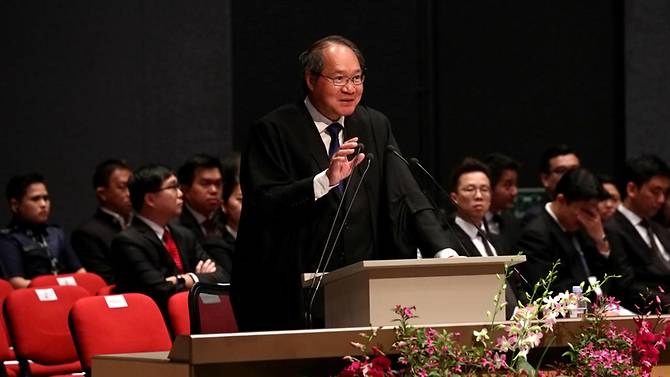Attorney-General Lucien Wong at the opening of Legal Year 2018 on Jan 8. (Photo: Nuria Ling/TODAY)
SINGAPORE: Singapore’s Government has not removed prosecutorial discretion for Section 377A, and the Public Prosecutor retains “full prosecutorial discretion” with respect to this, Attorney-General Lucien Wong said in a media release on Tuesday (Oct 2).
Referring to recent comments made on the law by former attorneys-general Professor Walter Woon and Mr V K Rajah, Mr Wong said their comments could give an “inaccurate impression” of the exercise of the Public Prosecutor’s discretion.
“Former attorneys-general, Professor Walter Woon and Mr V K Rajah, have recently suggested that it is not desirable for the Government and Parliament to direct the Public Prosecutor not to prosecute offences under Section 377A of the Penal Code, or to create the perception that they are doing so,” said Mr Wong.
“Such comments may give rise to the inaccurate impression that the exercise of the Public Prosecutor’s discretion has been removed or restricted in respect of Section 377A.”
Section 377A of the Penal Code criminalises sex between men. The law has recently come into the spotlight, with calls to repeal it made by members of the “Ready4Repeal” movement as well as prominent figures such as veteran diplomat Professor Tommy Koh.
Mr Johnson Ong Ming, a 43-year-old disc jockey and producer, has also filed a court challenge against the law, saying that it is inconsistent with parts of the Constitution.
Advertisement
Religious organisations have also called on the Government to retain the law.
The discretion to institute, conduct or discontinue any proceedings for any offence is vested in the Attorney-General as the Public Prosecutor under Article 35(8) of the Constitution, said Mr Wong.
POLICE WILL INVESTIGATE IF REPORTS ARE LODGED
In exercising this discretion, the Public Prosecutor seeks “only to advance the public interest”, taking into account “all the facts and circumstances of the case” and other matters such as the recommendations of the investigating agencies and the expressed intention of Parliament, he said.
“The Government’s position on Section 377A is that the police will not proactively enforce this provision, for instance by conducting enforcement raids,” added Mr Wong.
However, he went on to say that if there are reports lodged of offences under Section 377A – for example, where minors are exploited and abused – the police will investigate.
After conducting investigations, the police will then decide whether there is sufficient basis to refer the case to the Public Prosecutor, said Mr Wong. It will then be for the Public Prosecutor to determine whether to prosecute.
“In doing so, the Public Prosecutor exercises his independent discretion on whether to charge the offender, solely on the basis of his assessment of the facts, the law, and the public interest,” he said. “While the Public Prosecutor is entitled to consider public policies in exercising his discretion, these do not fetter the exercise of prosecutorial discretion.”
The Attorney-General gave the example of a case in 2008 where someone had been charged under Section 377A after a police report was lodged by a 16-year old male who had oral sex with the suspect.
Citing then-Deputy Prime Minister and Minister for Home Affairs Wong Kan Seng, Mr Wong said the case was referred to the Public Prosecutor, who “decided to charge the accused under Section 377A after taking into account all the facts and circumstances of the case, including the complainant’s age and the fact that the offence had taken place in a public toilet”.
Added Mr Wong: “The minister also made clear that: ‘… for any report disclosing an offence, police will place the evidence before the Public Prosecutor for a decision as to whether or not to proceed with prosecution.'”
The police’s exercise of its enforcement or investigative powers “should therefore not be conflated or confused with the Public Prosecutor’s exercise of discretion to commence prosecution”, said the Attorney-General.
“The Public Prosecutor’s exercise of prosecutorial discretion has always been, and remains, unfettered.”
He added: “In the case of Section 377A, where the conduct in question was between two consenting adults in a private place, the Public Prosecutor had, absent other factors, taken the position that prosecution would not be in the public interest.
“This remains the position today.”

